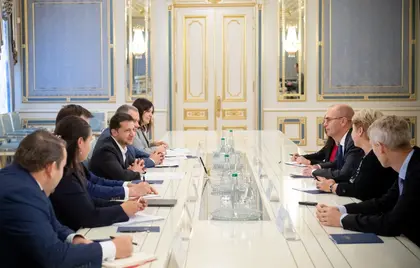The International Monetary Fund expert team had mixed grades for Ukraine’s performance one day after its Sept. 26 departure without a staff-level agreement on new lending, the clearest sign that all is not in order politically or economically in Kyiv yet.
Ukraine has restored its macroeconomic stability, lowered its fiscal deficits and decisively restructured its banking system since the 2014-2015 crisis, according to the IMF statement. However, it remains plagued with poor rule of law, a weak business environment and a growth that is too low to close the income gap with Ukraine’s neighbors.
- Check the most up-to-date Ukraine news reports from today.
- See the most contemporary Ukraine news reports for today.
JOIN US ON TELEGRAM
Follow our coverage of the war on the @Kyivpost_official.
“Growth is too low, however, to noticeably close the income gap with Ukraine’s neighbors. Per capita GDP (in PPP terms) in Ukraine is still very low—just 20 percent of the European Union average, the second-lowest level of all Central and Eastern European countries. Growth is held back by a weak business environment—with shortcomings in the legal framework, pervasive corruption, and large parts of the economy dominated by inefficient state-owned enterprises or by oligarchs—deterring competition and investment
Ukraine is trying to secure an IMF program under its Extended Fund Facility, which would replace an existing 14-month $3.9 billion standby facility meant to carry Ukraine through its election year. Multiple reports estimated that the potential new program would be around $5-6 billion.
National Bank of Ukraine deputy governor Kateryna Rozhkova expressed confidence that the program would be signed by the end of the year. Prime Minister Volodymyr Honcharuk and Finance Minister Oksana Markarova have also said that they are working closely towards securing cooperation.
Besides contributing to economic stability, an agreement would also reassure investors.
The IMF mission was headed by Ron van Rooden, an assistant director in the European Department of the IMF. The team came to Ukraine on Sept. 12 and spent two weeks in intensive analysis of the macroeconomic situation of the country, as well as its economic policies and held numerous discussions with Ukrainian authorities.
The IMF team stated that Ukraine has achieved tangible results in economic recovery after the economic crisis that followed the EuroMaidan Revolution.
“Following the deep economic crisis of 2014-15, the Ukrainian authorities have restored macroeconomic stability and growth has resumed,” IMF wrote. The statement praised Ukraine’s sound fiscal and monetary policies and a flexible exchange rate of the national currency hryvnia against foreign currencies. Such policies “have resulted in a sharp reduction in Ukraine’s external and internal imbalances.”
Other achievements lauded by the IMF included the low rate of fiscal deficit equaling about two percent of GDP, the elimination of the energy sector’s quasi-fiscal deficit, the maintenance of sufficient reserves (about $20 billion) and the current account deficit being around 3 percent of the GDP. The IMF has appreciated restructuring of Ukraine’s banking system.
However, the unfinished work outweighed the achievements.
The IMF pushed for more privatization of state-owned enterprises and criticized the domination of the Ukrainian economy by oligarchs. Fund experts suggest “improving spending efficiency and outcomes – including in health care and education” and expect Ukraine to maintain “prudent fiscal policies to ensure debt sustainability.”
In case Ukraine cannot sustain its debts, the fund will not obtain its loans back on time. In 2018 Ukraine’s foreign debt to GDP ratio amounted to 87.7 percent of the country’s nominal GDP, according to CEIC Data. This is far more than the EU-recommended ratio of 60 percent.
Most of all the IMF called for “firmly establishing the rule of law – including through judicial reform – and decisively tackling corruption.” Of equal importance to the Find is “enhancing competition and opening up markets – particularly in the energy and agricultural sectors.”
The IMF also expects Ukraine to take advantage of its Deep and Comprehensive Free Trade Agreement with the EU. Better integration with the European economy and its supply chains will provide Ukraine with sustainable growth opportunities in the future, according to the statement.
Currently, Ukraine owes the IMF 7.2 billion in special drawing rights, which amounts to about $10 billion.
Ukraine became an IMF member in 1992 and received its first loan in September 1998.
You can also highlight the text and press Ctrl + Enter




